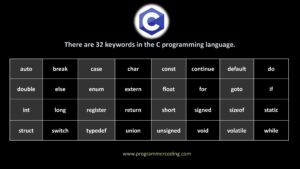Contents
What is Tokens?
Tokens in C are the most important concepts used when creating programs in C. We can define token as the smallest element in C. For example, we cannot create sentences without using words; Similarly, we cannot create a program in C without using C tokens. So, we can say that tokens in the C language are building blocks that serve in C mode or basic tools for creating programs.
Classification of tokens in C Language

-
Keywords:
Keywords are special words with prefixes in the C language.
Cannot be used as identifiers.
Examples: int, if, for, while, return

-
Identifiers:
Identifiers are names given to various programs (variables, functions, arrays, etc.).
Must start with a letter (uppercase or number) or underscore (_) and be followed by a letter, number, or underscore
-
Constants:
A constant is a value that does not change during program execution.
They can be many things: integer constants, floating point constants, character constants, string constants, etc.
Examples: 123, 3.14, ‘A’, “Hello”
-
String literals:
A string literal is a sequence of characters enclosed in double quotes (). Section
They represent a string of characters terminated by a null character (‘\0’).
Example: “programmercoding.com!”
-
Operators:
Operators are symbols that represent specific functions, such as arithmetic, logic, and relationships.
Examples: +, -, *, /, =, ==, &&, ||
-
Punctuators:
Punctuators are symbols that act as separators or delimiters in the C code.
Examples: ,, ;, (), {}, []
